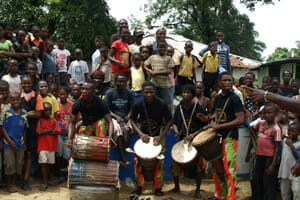News > Blog
Liberia: Water for Reconciliation
Published 08/08/2014 by Global Communities

Liberia: Water for Reconciliation
This story originally appeared in USAID Global Waters, July 2014.
Residents celebrate the completed construction of a new community latrine.
In Liberia, successive civil wars between 1989 and 2003 wreaked havoc on WASH infrastructure. Eleven years after the war ended, the country is still reeling from its impacts. The majority of the population lacks access to safe WASH facilities, and seven percent of children die before their 5th birthday. USAID’s five-year,
$10 million Improved Water Sanitation and Hygiene (iWASH) program is bringing communities there together to address these issues and make public health a dividend of peace.
The core of iWASH’s approach is community-led total sanitation (CLTS), a collective behavior change methodology in which community leaders visually demonstrate the proximity of fecal matter to food and water sources to other community members, invoking feelings of shame and disgust and spurring them to work together to build latrines, educate each other about hygiene and sanitation, and achieve open defecation-free status.
Natural leaders work as advocates in their communities helping to build latrines and educating residents.
These influential, motivated community members are called “natural leaders.” “These natural leaders are the point people for encouraging their communities to build latrines and clean up their environment,” said Pieter DeVries, chief of party for iWASH. “Once they have been successful in their own communities, they move to a neighboring community and repeat the process.”
When this happens, communities hold celebrations and are rewarded with rakes, cutlasses, shovels, wheelbarrows, and other tools to help them continue to build latrines. These celebrations help communities reinforce their commitment to improved sanitation and hygiene, and even aid with the process of reconciliation. “Natural leaders from historically conflicting communities have joined together in networks and performed joint celebrations of attaining open defecation-free status. Through these interactions the communities have become closer,” said Mr. DeVries.
After years of war, the country is enjoying the benefits of peace. More than 200 communities have been verified open defecation-free, 364 natural leaders have joined networks, and 112 natural leaders have successfully helped neighboring communities achieve open defecation-free status.
